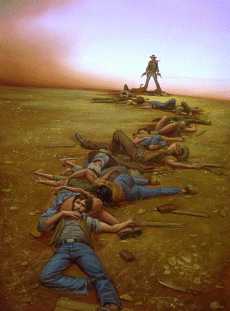By Lee Allen
The Arizona House of Representatives recently voted 44-14 to create an official National Day of the Cowboy to honor the role cowboys have played and continue to play in the Grand Canyon state. One Republican who voted in favor of the measure noted the state’s history was “exemplified by the characteristics of the hard life of the cowboy.”
One Democrat, a Navajo representative from Cameron, views that chronological archive through a different lens. While Representative Jamescita Peshlakai (Tangle People Clan, born for the Redhouse Clan), who voted in favor of the initial bill in committee, says she doesn’t have a problem lauding cowboys as a way of life or a vocation, by the time the measure came up for a final floor vote, she opted not to support the measure and plans to offer a solution of her own.
“It weighed on my conscious from initial committee passage,” she says. “I first voted ‘yes’ thinking of a cowboy in the contemporary sense–a drugstore cowboy, a rhinestone cowboy, a midnight cowboy–but the original cowboys purpose was to help pioneer and colonize the West and that means cowboys were involved in hand-to-hand combat with the American Indian.”
Peshlakai told reporter Howard Fisher of Capitol Media Services: “There’s more to the concept of ‘cowboy’ than someone who rides horses and herds cattle. The cowboy created the westward expansion so people could colonize the nation.” Adding to those thoughts, she told Indian Country Today Media Network: “I have the moral responsibility to remember our ancestors and singling out cowboys for recognition in a state with 22 federally-recognized tribes–but no specific day to honor Native American nations–did not sit well.
“We call history in textbooks the white man’s history, but as Native Americans, we have a complex history of our own and have frequently been ‘overlooked’ in its writing–especially in Arizona where we have a long history and a complex relationship with government. I don’t have it out for cowboys, in fact my father and brother are Indian cowboys, but very little voice is being given to the Native American in these discussions and I could jump up and down and turn blue on the floor of the House of Representatives and it would go in one ear and out the other of my colleagues.”


No comments:
Post a Comment